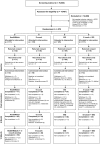The effectiveness of an online support group for members of the community with depression: a randomised controlled trial
- PMID: 23285271
- PMCID: PMC3532446
- DOI: 10.1371/journal.pone.0053244
The effectiveness of an online support group for members of the community with depression: a randomised controlled trial
Abstract
Background: Internet support groups (ISGs) are popular, particularly among people with depression, but there is little high quality evidence concerning their effectiveness.
Aim: The study aimed to evaluate the efficacy of an ISG for reducing depressive symptoms among community members when used alone and in combination with an automated Internet-based psychotherapy training program.
Method: Volunteers with elevated psychological distress were identified using a community-based screening postal survey. Participants were randomised to one of four 12-week conditions: depression Internet Support Group (ISG), automated depression Internet Training Program (ITP), combination of the two (ITP+ISG), or a control website with delayed access to e-couch at 6 months. Assessments were conducted at baseline, post-intervention, 6 and 12 months.
Results: There was no change in depressive symptoms relative to control after 3 months of exposure to the ISG. However, both the ISG alone and the combined ISG+ITP group showed significantly greater reduction in depressive symptoms at 6 and 12 months follow-up than the control group. The ITP program was effective relative to control at post-intervention but not at 6 months.
Conclusions: ISGs for depression are promising and warrant further empirical investigation.
Trial registration: Controlled-Trials.com ISRCTN65657330.
Conflict of interest statement
Figures
References
-
- Fox S (2009) The Social Life of Health Information. Washington DC: Pew Internet and American Life Project.
-
- Malhi G, Adams D, Porter R, Wignall A, Lape L, et al. (2009) Clinical overview: Clinical practice recommendations for depression. Acta Psychiatrica Scandinavica 119 Suppl. 439: 8–26. - PubMed
-
- World Health Organization (2008) The global burden of disease: 2004 update. Geneva: World Health Organization.
-
- Berger M, Wagner TH, Baker LC (2005) Internet use and stigmatized illness. Social Science and Medicine 61: 1821–1827. - PubMed
-
- Griffiths KM, Farrer L, Christensen H (2010) The efficacy of internet interventions for depression and anxiety disorders: a review of randomised controlled trials. MJA 192: S4–S11. - PubMed
Publication types
MeSH terms
Associated data
LinkOut - more resources
Full Text Sources
Medical


